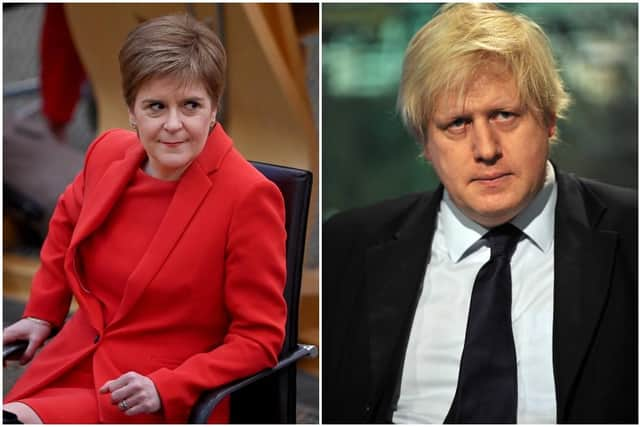Scottish independence: could Scotland’s 2021 election provoke a second referendum - and what has Boris Johnson said?
It is possibly the most contentious political issue facing Scotland each year - will the country be given a second independence referendum?
On 3 January, this question was put to Boris Johnson by BBC presenter, Andrew Marr.
Advertisement
Hide AdAdvertisement
Hide AdThe Prime Minister had been the face of pro-Brexit Britain, which undoubtedly helped define him as the rightful next Conservative party leader back in 2019.


But what are his views on granting the people of Scotland a second referendum? This is what we know.
Is Boris Johnson in favour of a Scottish Independence referendum?
Appearing on The Andrew Marr Show on 3 January, the Prime Minister described referendums as “not very jolly events” before outlining how they should be “once in a generation”.
This phrase has been at the heart of the debate over a second referendum.
In 2014, the SNP campaigned on a statement in the Scottish Government’s independence White Paper made by then-leader Alex Salmond,which read: “this is a once in a lifetime opportunity”.
This was then echoed several times by himself and his right-hand woman at the time, Nicola Sturgeon.
During his interview with Marr, Johnson went on to explain that although there had been two EU referendums in Britain - one in 1975 and the other in 2016 -the 41-year gap between them was “about the right sort of gap".
Advertisement
Hide AdAdvertisement
Hide AdNo Prime Minister of the United Kingdom wants to be the leader if or when the UK effectively splits, and Johnson seems in no rush to enable a second Scottish referendum to take place while he is in office.
Who decides if there will be another Scottish Independence Referendum?
This decision over whether to hold a second referendum still lies in the hands of the Westminster parliament.
The Union of the English and Scottish parliaments in 1707 was decided by both countries and this would suggest there would need to be an argument for dividing the UK in both England and Scotland before a referendum would be considered.
Or at least that is how it works in theory.
In reality, if there is a significant argument for Scottish Independence in Scotland - strong enough that the majority of Scots feel the British government would be undemocratic by not allowing a vote - then the likelihood of granting a vote would increase.
For example, former Prime Minister David Cameron has since alluded to the fact he had no choice but to grant the 2014 referendum after the SNP won the Scottish Parliamentary election in 2011.
With the Scottish parliament elections due to take place in May 2021, there is every chance this same ‘no choice’ situation could be knocking on Number 10’s door again.
Why does Nicola Sturgeon want a referendum sooner?
It has come as no surprise that the SNP, led by Nicola Sturgeon, have been outlining their reasons for a second referendum since they lost the vote in 2014.
Advertisement
Hide AdAdvertisement
Hide AdHowever, recent events such as the 2016 Brexit referendum and the differing approaches to handling the ongoing coronavirus pandemic have also heightened the argument.
Following the 2016 EU referendum, Sturgeon told the SNP party conference: “I am determined that Scotland will have the ability to reconsider the question of independence and do so before the UK leaves the EU.”
Following this, in 2017 the First Minister lodged a formal request with PM Theresa May to allow a second referendum on the day before Article 50 on leaving the EU was passed.
Her request was denied, and since then the referendum has been lurking in the background of every political event which involves cohesive (or in more cases than not, seperatist) approaches by all nations of the UK.
Following the recent Brexit deal announcement, Sturgeon responded, that Scotland “did not vote for any of this and our position is clearer than ever.
She added: “Scotland now has the right to choose its own future as an independent country and once more regain the benefits of EU membership.”
The SNP went on to vote for a no-deal Brexit in the House of Commons and Holyrood, calling for a divisive referendum to be allowed once again.
She has not yet given any response to Johnson’s latest comments, but her hopes for independence are widely understood.
Advertisement
Hide AdAdvertisement
Hide AdWhen is the next Scottish Independence referendum likely to be?
There is no definitive answer as to when the referendum will next take place.
If we go on Boris Johnson’s margins, 2055 is looking like the best bet.
However, the likelihood of this is slim to none if the SNP continue to win over the highest proportion of Scottish voters in the UK and Scottish elections.
Instead, the First Minister has hinted that she would ideally have the opportunity again halfway through the next Scottish parliamentary term,which would be 2023.
But this would require acceptance by the Westminster parliament, which at the moment doesn’t seem likely.
Boris Johnson continues to refute the possibility and Labour leader Sir Keir Starmer has also hinted he would be more likely to offer further devolution but not full independence.
In December 2020, a poll from Savanta ComRes found 58% of Scots were now in favour of being independent, but this could be an anomaly of support due to the upheaval of Brexit and Covid, which may not materialise in a genuine referendum.
Advertisement
Hide AdAdvertisement
Hide AdSNP MP Joanna Cherry, an avid Indyref2 and EU supporter,has also said she will take Westminster to court over their decisions to deny Scotland a referendum if her party wins in 2021.
Therefore, the likelihood of a referendum in Scotland under Boris Johnson - so sometime before December 2023 - could depend on the results of May’s Holyrood election.